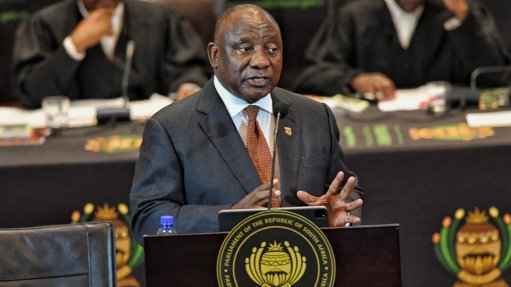
President Cyril Ramaphosa
President Cyril Ramaphosa has confirmed that the position of Public Enterprises Minister and the Department of Public Enterprises (DPE) will “cease to exist” once a new holding company for strategic State-owned enterprises (SOEs) has been created.
Appearing in Parliament to reply to questions posed by members of the National Assembly on Thursday, Ramaphosa said that government intended adopting the recommendation of the Presidential SOE Council that a State-owned holding company be established to house strategic SOEs and to exercise coordinated shareholder oversight.
“This will delineate the functions of policymaking and regulation from the shareholding and operations of those SOEs.
“Policymaking and regulation will reside in the relevant departments,” he said in response to a question posed by the Inkatha Freedom Party’s Mkhuleko Hlengwa.
The seven SOEs that currently fall under DPE, including Eskom, Transnet and Denel, would fall under the holding company and a process was under way to assess which other entities should do likewise. South Africa currently has more that 100 SOEs across various spheres of government.
“As I announced in the State of the Nation Address, government is undertaking a far-reaching reconfiguration of our State-owned enterprises landscape.
“This process of reconfiguration takes the overall approach that SOEs that operate in specific sectors of the economy should be placed under the relevant government departments.
“This is currently the case for most SOEs. The only exceptions are the seven State-owned companies that are in the portfolio of the Department of Public Enterprises.”
He said the reconfiguration process was being supported by the work of the Presidential SOE Council, which had made proposals to strengthen the framework governing SOEs and to determine an appropriate shareholder ownership model.
“A holding company will instil effective governance and enhance the efficiency of SOEs to achieve the government’s developmental objectives, ensure increased transparency and accountability and promote the commercial sustainability of SOEs.”
The State-owned holding company would also, the President said, enable streamlined governance processes, transparent financial systems, economies of scale in procurement, shared transactional services and adequate funding to SOEs to fulfil their respective mandates.
“The Presidential SOE Council is in the midst of an in-depth exercise to establish the strategic and developmental role of each SOE, their financial position and operational capabilities.
“As part of this work, the council will make recommendations on which SOEs could be placed in the proposed holding company.”
In parallel, the Presidency and the National Treasury were working together on a plan to rationalise the number of government departments for the “next administration”.
While there was no guarantee that the governing African National Congress would secure a majority in the 2024 election, Ramaphosa expressed confidence that it would indeed be in a position to implement the merger of ministries and departments that would be recommended once the review was completed.
Democratic Alliance leader John Steenhuisen questioned the President’s commitment to rationalising of his “bloated” Cabinet, however, and asked why a 2019 report by the Public Service Administration, which recommended a reduction in the number of departments, “has been gathering dust on your desk”.
Ramaphosa said the report had informed the 2019 decision to reduce the number of ministries from 34 to 28 and that further work was under way on the reconfiguration options.
He also defended his recent decision to increase the number of Cabinet Ministers to 30, saying both the new ministries in the Presidency were “transitory”, with the Electricity Minister focusing on an “existential” threat to society and the Planning, Monitoring and Evaluation Minister focusing on immediate issues that required implementation.
“It is a timebound increase [in the size of Cabinet] and we are going to revert back to much less than the 28 [Ministers].”